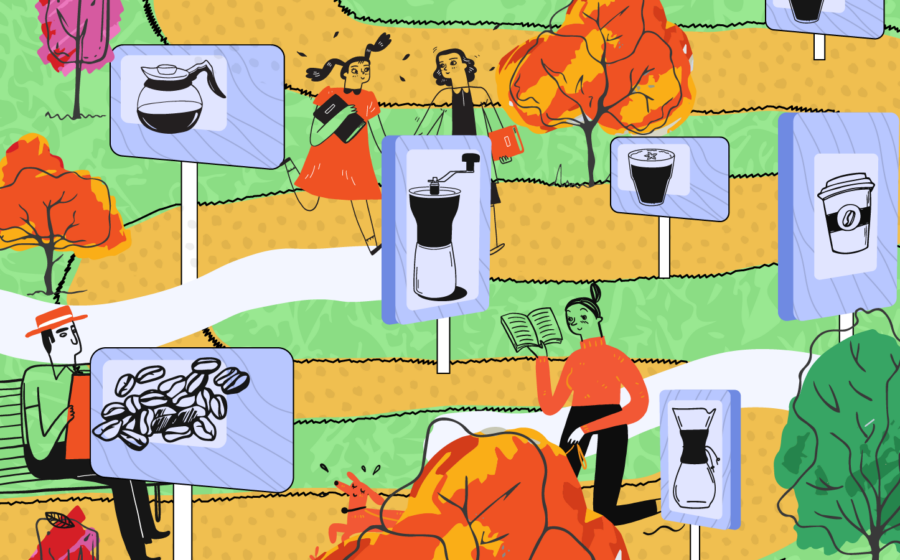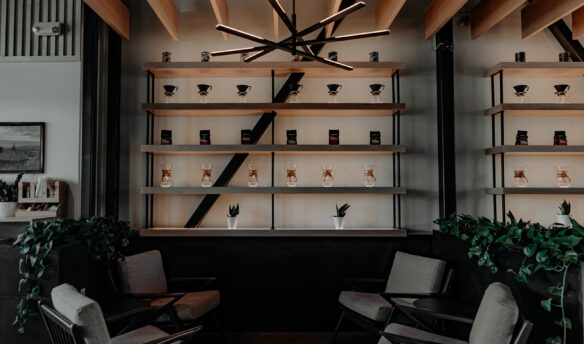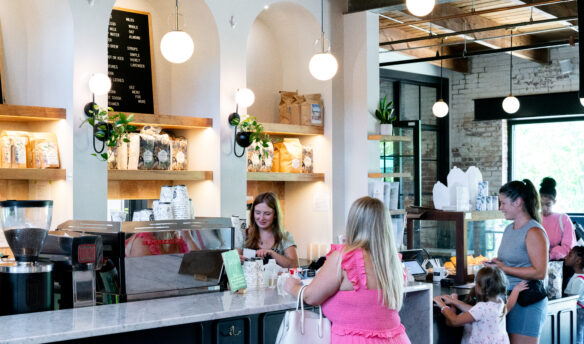I wear many hats in my coffee career. When I’m not working as a freelance writer or managing Fresh Cup’s sponsored content, I’m also one of the owners of Victus Coffee, a specialty coffee roaster and cafe in Hartford, Connecticut.
As part of our roasting services, we supply coffee shops, restaurants, fitness centers, offices, and other businesses with great coffee at wholesale prices. Through these relationships, I have the opportunity to chat with business owners and answer their questions about bringing our coffee to their customers, such as: What’s the best coffee for my menu? How do I get the right brewing equipment? How should I build out my coffee bar? Do I really need to offer pour-over coffee?
As part of Fresh Cup’s “How to Find” series—where we break down the tools and insights needed to open and operate a coffee shop—I spoke with wholesale coffee roasters about building cafe partnerships. Today, the coffee roaster market is continuing to grow, and there are more potential partners to choose from. As a business owner, that makes it all the more important to ask the right questions—and find the perfect fit for your coffee shop.
Wholesale Roasters Supply More Than Beans
Don’t forget that your wholesale coffee roaster partner can provide you with more than just coffee beans. They can also do everything from curating a unique menu of blends and single-origin coffees to offering training and consulting on equipment purchases and bar layout.
“Wholesale coffee roasters support the customer needs to the best of their ability, and guide cafes and restaurants from concept to creation,” says Logan Mahoney, vice president of sales at Atomic Coffee Roasters in Peabody, Massachusetts. Mahoney says that increasing competition is leading to roasters providing more products and services than ever. “Nowadays, the expectations have risen for coffee roasting partners,” he says.
Mahoney acknowledges that businesses, especially those run by first-time owners or operators, have lots to learn when running a coffee program—and that’s where roasters can offer much-needed guidance. “A lot of new shops we work with haven’t had preexisting industry experience, so it’s important to be able to guide them through the early stages of their business so they can feel confident in you as a true partner while they launch their dream cafe,” he says.
The wholesale team at Joe Coffee Company in New York City takes this full-service approach to heart. Samantha Lutzer, vice president of business development, says the company offers partners a comprehensive experience, including everything from assistance in setting up a coffee program and barista training to marketing support.
Lutzer says it’s important for potential partners to go behind the scenes. “We also bring our customers, big or small, into the roastery for a special experience where they can see the team doing the work and cup coffee blindly,” Lutzer says. “Then it’s about meeting the client where they need to be on equipment and coffee solutions, and supporting them through the launch and beyond.”
(Not) One For All
It’s worth noting that not all potential roasting partners will have the same wholesale offerings and approach.
Your coffee shop will have specific needs, and some roasting companies may not be able to fulfill them—and that’s okay! “The first thing I ask them is, what are their expectations for this relationship? What’s their business concept? Where are they with equipment?” says Gina Mauro of Texas Coffee Traders in Austin, Texas.
Mauro, who is in charge of facilitating wholesale relationships, says it’s critical to understand a potential partner’s needs: Do they need help picking coffees? Do they expect a roaster to give or loan out equipment? Will their staff need training? Using the answers she receives, Mauro then creates a plan, which could involve setting up coffee samples, connecting clients to equipment providers, or scheduling time to go over construction and buildout needs.
“It’s about finding the right fit for your individual needs and business plan,” says Mahoney. He says it can be easy to be swayed by big-name roasters, so creating a list of needs and objectives is critical. “Oftentimes, new shops will open [accounts] with larger roasters because of advertisement, level of support, or some other working relationship, etc. But over the years local roasters have upped their game, and there are plenty of amazing local roasters all over the country that can provide a tremendous amount of support and help you every step of the way.”
Roasters Evaluate You, Too
Remember that roasters also evaluate potential partners to determine if they’d be a good fit for their existing operations. Naturally, what determines a “good fit” will vary from roaster to roaster.
“Wholesale for us is not transactional,” says Lutzer. “We work to align and connect with our brand partners that get immersed in our Joe Coffee Company brand.”
Because of this, she explains that a client who is interested in a frequently rotating selection of single-origin lots may not be the best fit for the company’s wholesale program. “We can’t build a sustainable supply chain like that. That’s not the business model that works for us, but that works really well for other coffee roasters,” Lutzer says. Instead, Joe Coffee Company has a core product line and introduces new products, for both wholesale and retail, a handful of times throughout the year.
Mahoney says that Atomic Coffee Roasters seeks out clients who are invested in learning more about coffee, and who constantly evaluate their coffee programs. “Regardless of if it’s a coffee shop, grocery store, restaurant, etc., it’s more about creating a long-lasting partnership. Our team is always ecstatic when a potential wholesale client just wants to learn more, or has the willingness to do so.”
Many roasters implement internal standards that help them partner with their ideal clients. These policies are also in place to ensure that their roasting operations can continue profitably. These standards may include required minimum-order quantities, shipping/delivery fees, order schedules, product availability, and guidelines around using their brand in promotional efforts.
While roasters will be upfront with these standards, it’s up to you as the client to determine if they work for your business as well. For example, if a roaster has a 50-pound minimum order requirement, but your coffee cart only needs roughly 20 pounds of coffee per week, they may not be an ideal partner for your business.
Likewise, many shops need equipment—something not every roaster can provide.“We’re happy to help you get the best price and broker a purchase for you, but we’re not in the business of loaning equipment,” says Mauro. Although some roasting companies may be able to loan or provide free equipment, most locally owned roasting companies choose not to offer this service. Instead, many roasters will partner with espresso machine technicians and manufacturers to help pair businesses with equipment and support services.
Where To Find Coffee Roasters
Often, finding the right roaster starts by looking in your own backyard. A simple Google search for “coffee roasters near me” will give most folks several roasters to work with. You can also reach out to your local network and see which coffee roasters they recommend. “We get a lot of business from word-of-mouth referrals,” says Mauro.
But you also aren’t limited to roasting partners that are within close proximity of your business. After all, those roasters may or may not be able to meet your specific business needs, depending on the nature of their wholesale programs.
Plus, with social media at your fingertips, it’s easier than ever to connect with roasters around the world—many of whom offer shipping for wholesale orders—and find the perfect roasting partner for your cafe.
Regardless of where you find your next roasting partner, the most important step is to have an honest and open initial conversation. As Mahoney reiterates, “The role of a coffee roasting partner is so vast that it is important to know the specific needs of the shop owners before the partnership launches so, as the roasting partner, you know how best to assist.”
If you’re looking for help finding a roaster, check out Fresh Cup’s matching service, RoasterLink. RoasterLink can be helpful in tailoring your outreach to roasting partners that offer the necessary products and services for your cafe.
















